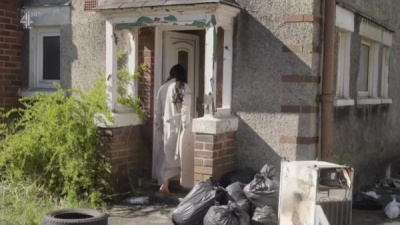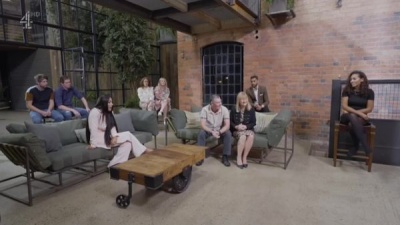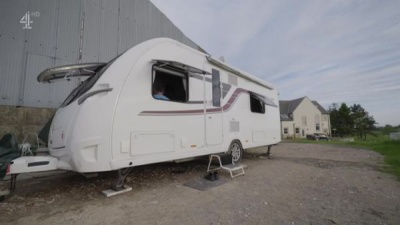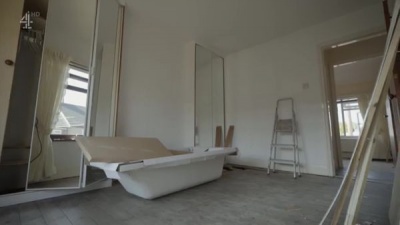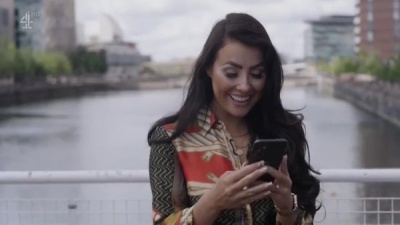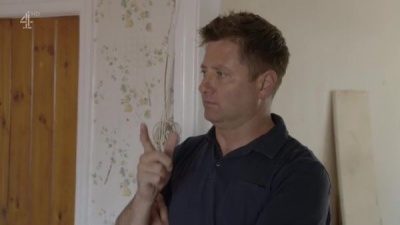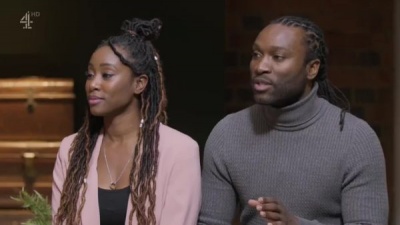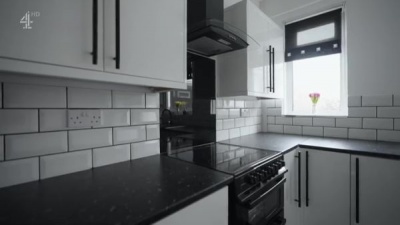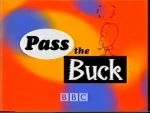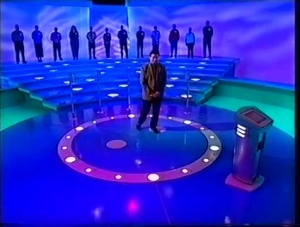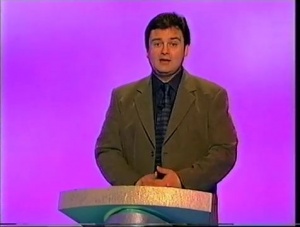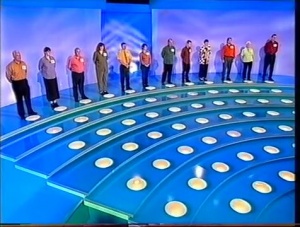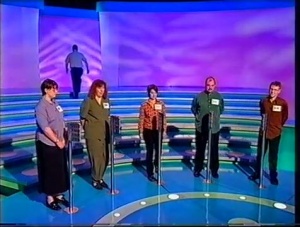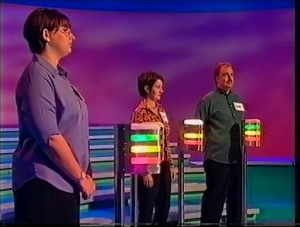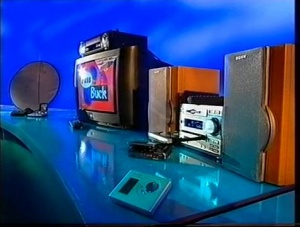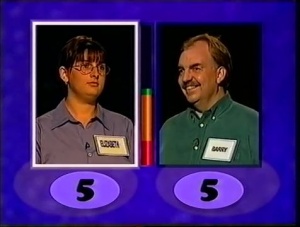Weaver's Week 2022-06-12
Last week | Weaver's Week Index | Next week
"Flippin' 'eck, Tucker!"
Contents |
Flipping Fast
South Shore Productions for Channel 4, from 25 May
What do they mean by "flipping"?
Flipping: adv/adj, an intensifier, euphemistically echoes another f-word. No, they don't mean that.
Flip: vb, make something turn over. Not really, this isn't another Channel 4 show about food, especially not burgers.
Flip: vb, in finance, to resell quickly. Ah, that's what they mean.
The task in Flipping Fast is to buy a house, tart it up, and sell it. They'll measure success by the difference between money spent and money received; the most successful team will take a £100,000 (120 000€) prize.
Six teams take part in the series, two solo traders and four couples. After the usual run of confusing introductions in the opening episode, the show quickly settles into a routine. Only two of the competitors will buy a house in this episode, and we'll follow them from purchase to sale. The others have walk-on parts – being outbid for a possible house, or seeing something that just isn't right.
George Clarke is the host, a softly-spoken Wearsider in a smart-casual jacket. Lifestyle On 4 viewers might know him from Amazing Spaces. He's joined by married couple Stuart and Scarlette Douglas, they've the intensity of a laser and the experience as professional property developers.
Our opening show features Gordon and Pamela from Norfolk. They've bought a decrepit house in Stockton-on-Tees, an area they've never visited before because it's about 500km from where they live. They don't know how decrepit the house is, because they didn't go and see it, because it's about 500km from where they live. Rather than live in the house they're renovating, the couple take their own caravanette, parked about 500m from where they don't live.
There's one rule of Flipping Fast: do not break the £100,000 budget. Each team was allocated a hundred grand of South Shore's cash; all five losers will have to pay it back at the end. Should a team go overdrawn on their allowance, they'll be eliminated from the game at once. They've mentioned this rule so often that it becomes Chekhov's Gun: they're foreshadowing someone being cast out.
Gordon and Pamela don't break the budget. They reckon they can renovate the place for £3000. But they don't know how unsafe the house electrics are, because it's about 500km from where they live. A professional electrician doesn't come cheap. DIY repairs and decoration do come cheap – Flipping Fast charges only for materials, it values the competitors' labour at £0.
And that is very interesting.
We mentioned recently that Channel 4, as a whole, represents and gently critiques the whole society. Flipping Fast combines two social elements: the culture's obsession with "property", and the myth that one can get something for nothing.
In theory, house prices should be based on a monthly repayment. If you're paying £800 a month for 25 years, your house is worth about £250,000. Maybe a bit less, because you'll need to spend money to keep it in good condition; maybe a bit more, because inflation will alter the price over such a long period.
For Britain, this economic truth has long been ignored. It's in the interest of the populist press and their lapdog politicians to pretend that house prices will always rise, and to restrict new builds so as to make this happen. As a result, the desire of the minority is allowed to happen, and damn the social consequences.
The social consequences are dire. The people who live in houses tend not to own them, but to rent. They've got to pay the landlord's £800 mortgage, plus a fee to the letting agent, plus some profit to the landlord so he can "make" some "profit" on his "investment". The landlord has many rights, the tenant can be thrown out with two months' notice or face crippling rent rises. And what do you get for the £1000 a month fee? A roof over your head, and (er) that's it.
None of this is directly mentioned in Flipping Fast. It's an unspoken undercurrent. We think this is a missed opportunity, but perhaps this show brings in the advertising moolah so Channel 4 can tell this social story elsewhere.
But even Flipping Fast isn't immune from the property bubble. One contestant wanted to buy a house with a busted roof, and saw the guide price of £27,500. It eventually sold for £81,000, presumably to someone who wasn't constrained by a total budget of £100,000.
And it isn't immune from the unpaid labour quandary. Harriet, another competitor, was able to make a big profit after calling in "favours" from her in-laws who just happen to be builders. Is it morally fair that she was able to grab mate's rates? Of course not. Is this representative of the uneven property bubble, which too often relies on a handout from The Bank of Mum and Dad? 'Fraid so.
Eventually, Gordon and Pamela managed to sell their house. They'd made a small profit of about £1500. That's the entire reward for some months' effort, surely at less than a living wage.
Ultimately, it's raw capitalism that counts, the biggest profit across the series will win. While less odious than The Apprentice or Future Food Stars, we're not enthused. Never trust a show that knows the price of everything and the value of nothing, as Flipping Fast so clearly does.
And there's a much worse sin: the show is hugely predictable. Act 1: find a house, buy it. Act 2: oh it's worse than we expected. Act 3: work and paint and repair and bang. Act 4: sell for profit. The show is a grind, a lot of hard work and the "big reveal" is a number plucked out of thin air. Shows like Changing Rooms give us a visual reward at the end, something sumptuous and/or hideous to evince a reaction. Flipping Fast just shows us a humdrum house and talks numbers.
Some minor pieces of credit: they have made each individual episode a self-contained story, with a beginning and a middle and an end. By messing with time, South Shore have made a coherent piece of art. The hosts – George and the Douglases – give sensible and cogent advice, but don't force the contestants to accept it, and acknowledge where they're wrong. Much of the programme is delivered as a video diary, with George providing minimal narration.
Another good thing: they don't make rebuilding look particularly attractive. It's hard work, it's a risk, and this comes across in the show. Nobody is going to watch Flipping Fast and think it's an easy way to make money.
But, having watched three episodes, we're going to leave the series here. We're not invested in the characters, we don't particularly appreciate the foundation, and it feels a bit too corrosive for society as a whole.
Pass the Buck (2)
Zenith North for BBC1, 1999
We enjoyed the 24 Hour Game Show Marathon last weekend. One highlight was The Wheel where everything that could go wrong did go wrong – what will Michael McIntyre do when nobody gets a question right and they run out of stumpers? They also played I Literally Just Told You live, it took about 90 minutes to play with their Maggie and Emy writing questions live. Doubtless there are others we can watch when the catch-up stars align.
Another show they played was Pass the Buck. We had a version over here, and it's now old enough for us to see it as nostalgia.
The opening titles feature a group of cartoons scratching their heads and looking puzzled. They're lit in orange and purple: straight away, we know we're in the late 1990s.
Another way we know we're in the late 1990s: our host is Eamonn Holmes. He stands at the foot of a set of shallow stairs, which narrow at they come down to him. Twelve people are lit in silhouette behind him. The show explains itself in one shot: we're going to see most (but not all) of the contestants come down the stairs, until about half of them reach the studio floor.
As the lights go up, we hear from the players. "I'm Michael, from Manchester, and I work in a call centre." And so on, repeated for all twelve contestants.
Round one is "Fast "– what?! Oh, "Fast buck". A wrong answer leads to an early exit. The players get a question and three seconds to answer. Right answer and the buck passes to the next player. Wrong answer, or no answer, or a repeated answer, and the buck stops and you're gone. No second chances. It's a little bit like Lightning in that you don't want to be caught when things go off; it's completely unlike Lightning in that you control your own destiny.
The first category is girls' first names beginning with J. Joan, what's your first answer? "Jennifer".
So play passes to the next player in line, left-to-right as we see it. Adjudication is by a piercing bleep, and it seems to be very swift – they've doubtless got a list of correct answers and are crossing them off as they're given. Must be a very long list, there's at least 200 names beginning with "J".
Someone will eventually give an incorrect answer, and hear a horrible wrong answer tone. Eamonn will have a quick chat with the player, perhaps remark on how good the round was (or wasn't), and ask that player to leave the game. Everyone else comes down to the next step.
As the game continues, we get more similarities with other shows. "I'll give you an example, but you can't use it", almost exactly a phrase used by Ted Rodgers on 3-2-1 twenty years earlier. Back then, the couples were asked to give things in a category, alternating answers, against the clock, and it stops on an error or repetition.
To mix things up, there's an arithmetic question. "Two whole numbers less than 68 to make a total of 34." "13 and 21" the first answer. "Two times seventeen", that's good. "50 minus 16", that's great. "68 divided by 2", ah, no. Eamon's apologetic, but quite firm about less than being strictly less than. If he'd wanted "less than or equal to", he'd have asked it.
Eamonn's presentation isn't perfect, we never quite know when he's finished speaking. He says, "I'm looking for ingredients commonly used in salads." He could say, "I'm looking for ingredients commonly used in salads — go!" A little clarity makes the whole thing fairer.
Many of the lists are a little vague, though the adjudicators seem to accept any reasonable answer. If they were making Pass the Buck these days, they might use more well-defined lists like they did on Who Dares Wins – and that would limit the show's appeal. There are some very narrow lists later in the game ("Stephen King novels", "Regulars on The Young Ones") and some very broad ones early in the show. It's strange to have "England" accepted as a country, but Richard Osman's canonical definition won't be heard for ten years.
Twice in the show there's a "Memory moment" – eighteen words appear, one by one. How many will the remaining contestants remember?
Once we're down to five players, we take a brief break for the viewer competition. Which of these three answers is correct? Call the 0901 number (calls charged at 60p (then 95 euro-cent)) and someone will win a camcorder. Quickly, we're back into the game, Eamonn reminds us of the five surviving players.
Each is now standing behind a stick with three coloured lights on it: green, then yellow, then red. It's the same sort of question as before, but now when you give a correct answer, you get to choose who answers next. Easy to pick on someone, perhaps a weak player, perhaps someone you think is your biggest opponent. Or perhaps someone on their last life. This round's a bit less fluent than earlier, because we have to think about answers and nominations.
You'll have noted that the show started with 12 players and only one will win. Is this a one-and-done programme? No, the four players who make it to the floor but don't win the game are invited back to the next episode (up to a maximum of five appearances). These days, they'd doubtless keep everyone until they win or we run out of week.
The prizes are noted next. A 66cm NICAM digital widescreen television and VCR. Yep, an analogue CRT widescreen telly, thus dating the show almost precisely to 1999. Or a micro hi-fi with recordable minidisc, CD, tape, and radio tuner, plus a portable minidisc player. Or (get this!) a worldband short-wave radio receiver, plus a portable MP3 player! That's tech for you! Leafing through back issues of the Argos catalogue, we see each bundle cost about £400 (600€) at the time. Allowing for inflation, that's around £850 today.
The two finalists step forward, and the final is different from the one we saw on Game Show Marathon. It's a head-to-head shootout, one point for each correct answer, the question dies if you're wrong. Play passes whether your answer is right or wrong. Highest score after two-and-a-half minutes wins, and picks one of the three high-tech prizes. Hope the winner's still using their VCR.
Pass the Buck is a light and entertaining half-hour. Eamonn Holmes hosts with a gentle authority, he encourages the contestants and is a pleasant host. Even when he's serious, we know he's doing it for the good of the game.
Could it still work today? Possibly. We've noted some concerns about the questions, but would we rather have slightly loose questions or a 50-second rules spiel like Warwick Davies read out on Wednesday's Tenable? Would the game be improved by keeping the same contestants all week? Television is allergic to 30-minute programmes not called House of Games (3); would Pass the Buck work if we started with 14 players and invited 6 to the second phase? Or started with 16 players who stay all week and we know five will win?
As it is, Pass the Buck had two series on our screens – one with Fred Dinenage in '98, this one with Eamonn Holmes straddled '99 and 2000. We enjoyed it while it was on, but didn't really miss it when it left. A bit like Eamonn himself, who hasn't appeared in this column since 2016.
In other news
We're sorry to hear that Eamonn Holmes has been hospitalised, and wish him a swift recovery.
More crossover news, as Pointless correctly found there was no Swashbuckle board game. Captain Captain, are you pondering what we're pondering?
 Gem has stopped being a goody-goody, and joins in the pirates' naughtiness. She gets covered in slop. Are these facts connected?
Gem has stopped being a goody-goody, and joins in the pirates' naughtiness. She gets covered in slop. Are these facts connected?
While we try to work out what - if anything - Seaweed's thinking, here's that excruciatingly long Tenable question qualifier. In full.
- The ten frozen vegetables after "broccoli" sold at Iceland. We'll just clarify this for you. We're looking for the 10 vegetables that come after broccoli which are sold separately at Iceland, as part of their own brand range. This list is based on the following search on the iceland dot co dot uk website. First under 'Frozen', then under 'Vegetables and Rice', finally, then under 'Vegetables'. We're not including vegetables sold on any other pages of the website. There are no potato products on our list. This is according to the iceland dot co dot uk website as of 10th February 2022.
The next episode of Tenable will air when Warwick's finished the disclaimer.
A pair of finals this week: Taskmaster (C4, Thu), and Countdown (C4, Fri). There's a cricket special of Pointless Celebrities (BBC1, Sat), conveniently timed for when the Test isn't on. ITV has a new episode of Celebrity Play Your Cards Right in the Epic Gameshow strand (Sat), don't forget to miss it.
Pictures: South Shore, Zenith North, BBC Childrens & Families.
To have Weaver's Week emailed to you on publication day, receive our exclusive TV roundup of the game shows in the week ahead, and chat to other ukgameshows.com readers, sign up to our Google Group.


